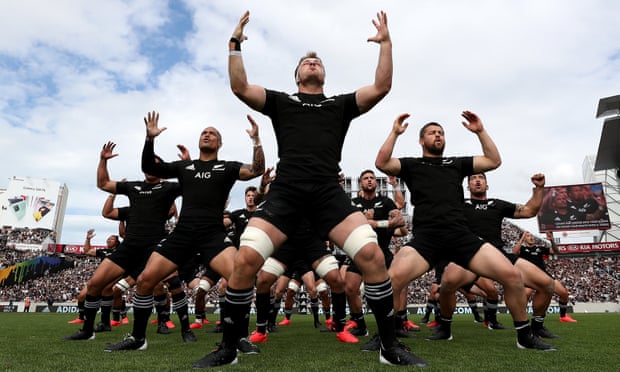All Blacks sale could prove a private equity intrusion too far for lovers of sport
Towards the end of last year, the consultancy firm Deloitte issued a pamphlet to investors outlining the uncertain financial landscape created by Covid-19. “An increasing number of companies and economic sectors are under severe pressure,” it noted. “Millions of jobs have been lost and thousands of businesses are at risk. This is a classic scenario where private equity can play a role.”
Right on cue: in a time of fear, a hero will come. Often several heroes, bearing wads of cash and a stern list of conditions. And so, here we are: seven words that perhaps encapsulate the dystopian weirdness of 2021. The All Blacks are up for sale. Yes, those All Blacks: not just one of the most successful and famous teams in the world, but a culture and tradition, a heritage and a lineage. A name that – for all its vaguely irritating self-mythologising – resounds well beyond the borders of New Zealand, well beyond the shores of rugby union.How do you package up and sell more than 115 years of rugby history as if it were a supermarket deli item? As it turns out, quite easily. Last week, after months of flirtation, New Zealand Rugby voted to sell off a 12.5% stake to the US firm Silver Lake. If the deal goes through, it will be the first time the All Blacks have ever come under private ownership. And even if you have no personal affinity with the team itself, it’s still probably worth taking notice. Because whatever your sport of choice, make no mistake: the wandering hands of private equity are almost certainly coming to a knee near you.
First, there’s the need. NZR has been in a parlous financial state for some years, and is now weathering catastrophic losses as a result of the pandemic. Last year it made a quarter of its staff redundant. And for all the affection and recognition enjoyed by its flagship team, it has always been forced to operate within the strictures of a relatively small domestic market. On this basis, mortgaging a portion of its future broadcasting and commercial rights for a £200m cash injection – real money for the struggling regions and clubs at the beating heart of the game – seems to make eminent short-term sense.
The real question, of course, is what Silver Lake – whose other investments include a 10% stake in Manchester City and a significant holding in the Ultimate Fighting Championship – thinks it’s getting for its money beyond a cut of the jersey sales. Private equity has been infiltrating sport on some level for decades, but it’s only really in the last couple of years that the market has begun to bubble, driven not just by Covid but by the increasing willingness of federations and leagues to prostrate themselves.
For a long time, if you wanted to invest in sport, you bought a stake in a club or a team. But clubs come with a downside: often they’re loss-making or laden with debt. Inconveniently, they sometimes lose or get relegated. Sometimes, as certain Premier League clubs have recently discovered, they have fans with strong opinions. Above all they have little influence over their main sources of revenue: the broadcast rights deals that are overwhelmingly struck by leagues, federations and governing bodies. And so in recent years, this is where private equity has trained its sights. Tired of jockeying for position and influence in the league? Buy the league. Make your own rules.
In many ways the game-changer was CVC’s lucrative stewardship of Formula One between 2006 and 2017, during which the sport gradually became less likable, less accessible and yet wildly more profitable. Since then CVC has made significant investments in Premiership Rugby, Pro 14 and the Six Nations. Currently, three of Europe’s big five football leagues – the Bundesliga, Serie A and La Liga – are in discussions with private equity firms over selling various-shaped stakes.
And as with NZR, sport’s embrace of private equity is driven as much by long-term existential angst as by short-term cashflow. Here it helps to think of the institutional investor as a sort of soothsayer, promising to navigate your boat through the thick mists of the future. Private equity hears your cry. Private equity feels your pain. Private equity shares your disquiet over the stagnation of traditional media rights and the audiences of the future: these perfidious children with their Twitch and their TikTok and their curious habit of eating detergent pods. But private equity can help. Just sign here, here; here.If the present feels unsettling enough, then perhaps the real question is what follows: the next move in a game where it has already been established that everything is for sale. The FA has already toyed with selling Wembley to plug its financial black hole. What if a big private equity firm comes and offers to buy the FA Cup? What if it wants the right to choose the England manager, or its seat on Ifab, which sets the laws of football? Could we really be certain a weary, cash-strapped organisation would hold firm? Or that we, the fa
ns and consumers, could do anything to prevent it?
In New Zealand, the resistance has largely been led by the players. But whatever ultimately transpires, the sale of the All Blacks – coming so soon after the attempted European Super League coup – feels like an elemental moment. It is, at its heart, a question of who gets to own sport. Who gets to own our traditions, our memories, our institutions, our passions. It feels, above all, like a moment to wake up.

